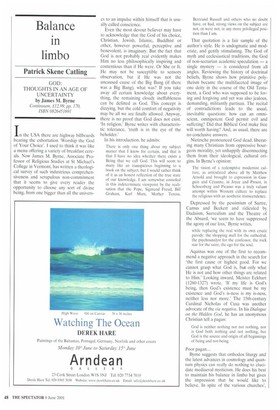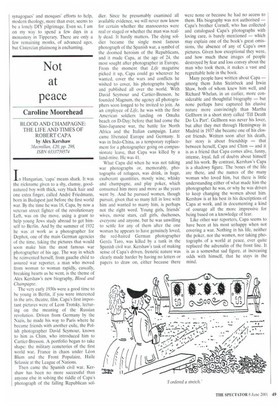Balance in limbo
Patrick Skene Catling
GOD: THOUGHTS IN AN AGE OF UNCERTAINTY by James M. Byrne Continuum, £12.99, pp. 170, ISBN 0826451691 In the USA there are highway billboards bearing the exhortation 'Worship the God of Your Choice'. I used to think it was like a menu offering a variety of breakfast cereals. Now James M. Byrne, Associate Professor of Religious Studies at St Michael's College in Vermont, has written a theological survey of such industrious comprehensiveness and scrupulous non-commitment that it seems to give every reader the opportunity to choose any sort of divine being, from one bigger than all the univers
es to an impulse within himself that is usually called conscience.
Even the most devout believer may have to acknowledge that the God of his choice, Christian, Jewish, Islamic, Buddhist or other, however powerful, perceptive and benevolent, is imaginary. But the fact that God is not probably real evidently makes Him no less philosophically inspiring and contentious than if He were. Or She or It. He may not be susceptible to sensory observation, but if He was not the uncaused cause of the Big Bang (if there was a Big Bang), what was? If you take away all certain knowledge about everything, the remaining cloudy ineffableness can be defined as God. This concept is dizzying, but the cold comfort of negativity may be all we are finally allowed. Anyway, there is no proof that God does not exist. 'In religion,' Byrne writes with characteristic tolerance, 'truth is in the eye of the beholder.'
In his introduction, he admits:
There is only one thing about my subject matter that I know for certain, and that is that I have no idea whether there exists a Being that we call God. This will seem to many like an inauspicious beginning to a book on the subject, but I would rather think of it as an honest reflection of the true state of our knowledge. I am somewhat consoled in this indeterminate viewpoint by the realisation that the Pope, Sigmund Freud, Bill Graham, Karl Marx, Mother Teresa. Bertrand Russell and others who no doubt have, or had, strong views on the subject are not, or were not, in any more privileged position than I am.
That quotation is a fair sample of the author's style. He is undogmatic and moderate, and gently stimulating. The God of myth and ecclesiastical traditions, the God of non-sectarian academic speculation — a single mystery — is considered from all angles. Reviewing the history of doctrinal beliefs, Byrne shows how primitive polytheism became the multifaceted image of one deity in the course of the Old Testament, a God who was supposed to be loving and forgiving and yet was also jealous, demanding, militantly partisan. The recital of contradictions leads to the usual, inevitable questions: how can an omniscient, omnipotent God permit evil and suffering? Did that Biblical God make free will worth having? And, as usual, there are no conclusive answers.
Nietzsche pronounced God dead, liberating many Christians from oppressive bourgeois morality, yet unhappily disconnecting them from their ideological, cultural origins. In Byrne's opinion:
The vision of a redemptive modernist culture. as articulated above all by Matthew Arnold and brought to expression in Gauguin and Cezanne, in Joyce and Proust, in Schoenberg and Picasso was a truly valiant attempt within Western culture to replace the religious with an aesthetic transcendence.
Depressed by the pessimism of Sartre, Camus and Beckett and ridiculed by Dadaism, Surrealism and the Theatre of the Absurd, 'we seem to have suppressed the agony of our loss,' Byrne writes,
while replacing the real with its own ersatz parody: the shopping mall for the cathedral, the psychoanalyst for the confessor, the rock star for the saint, the ego for the soul.
Aquinas was one of the first to recommend a negative approach in the search for 'the first cause or highest good. For we cannot grasp what God is, but only what He is not and how other things are related to Him.' Looking inward, Meister Eckhart (1260-1327) wrote, 'If my life is God's being, then God's existence must be my existence and God's is-ness is my is-ness, neither less nor more.' The 15th-century Cardinal Nicholas of Cusa was another advocate of the via negativa. In his Dialogue on the Hidden God, he has an anonymous Christian tell a pagan: God is neither nothing nor not nothing, nor is God both nothing and not nothing, but God is the source and origin of all beginnings of being and not-being.
Poor pagan...
Byrne suggests that orthodox liturgy and the latest advances in cosmology and quantum physics can really do nothing to elucidate mediaeval mysticism. He does his best to maintain his balance in limbo but gives the impression that he would like to believe. In spite of the various churches', synagogues' and mosques' efforts to help, modern theology, more than ever, seems to be a lonely DIY pilgrimage. Even so, I am on my way to spend a few days in a monastery in Tipperary. There are only a few remaining monks, of advanced ages, but Cistercian plainsong is enchanting.























































































 Previous page
Previous page